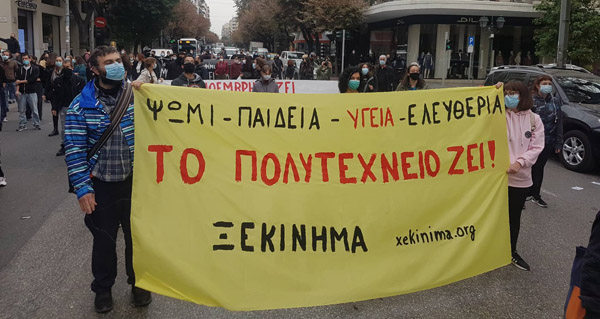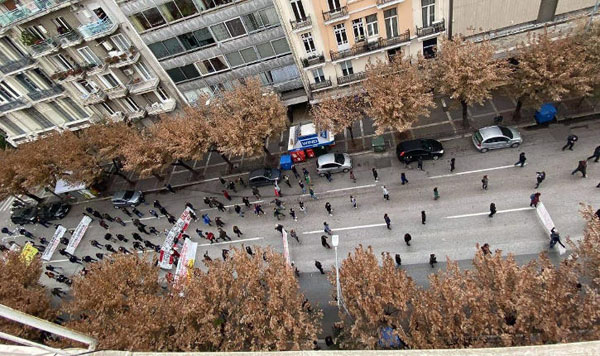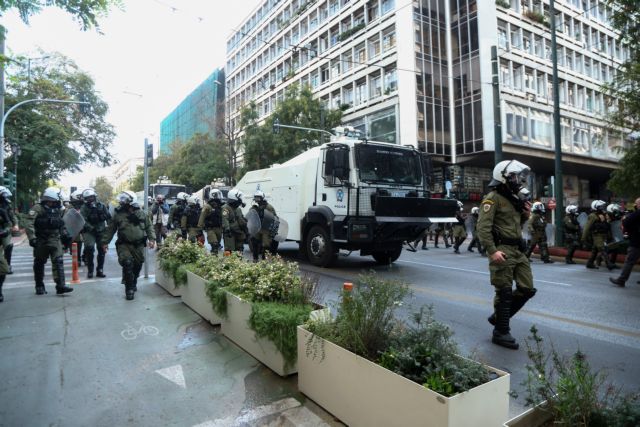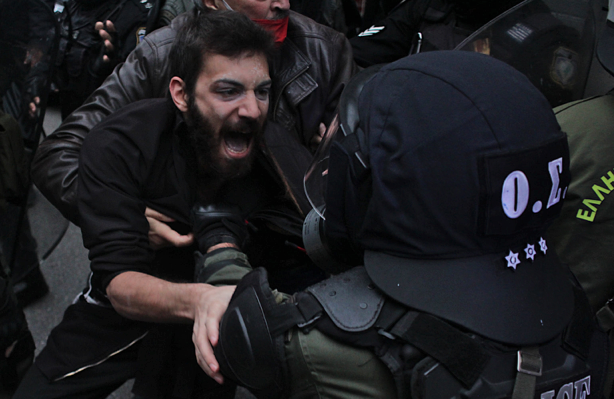Andros Payiatsos
November 17th is a day of historic importance for the Greek working class and the Left. 47 years ago, in November 1973, students and workers occupied the Athens Polytechnic (one of the Greek universities with particular specialization in sciences, especially engineering) in the city center, demanding the fall of the military regime (the army had taken power in 1967). They set up an amateur radio station and began to call on the mass of the population and the working class of the city to come out and bring the military junta down.

Seeing that the mass of the population was beginning to stir and thousands upon thousands were gathering around the Polytechnic, which began to be seen as the center of a national revolt, the military used the army to crash the revolt On November 17th. They used snipers to shoot leading students from nearby rooftops and tanks to enter the polytechnic and crush the rebellion. Over 100 students and workers were killed but accurate number will never be known. This attack did not save the regime which collapsed less than 12 months later, in July 1974 after the invasion of Turkey in Cyprus.
Since then, 17 November is an anniversary that is always celebrated by the working class and the Left in all cities. Until the end of the ’80s the demonstrations numbered hundreds of thousands. After the ’90s their size dropped immensely but they still numbered many thousands and often tens of thousands.
2020 was the first year that a government decided to ban the demonstration, in the name of protecting public health in view of the Covid-19 pandemic. A few days before the rallies, the government decided by… decree of the chief of police(!) that any gathering of 4 or more individuals was illegal! The previous time such a decision was taken was 1973, by the military junta! This was, in other words, a double provocation!
The Left refuses to accept the ban
Unfortunately, the tops of the national trade unions, once again, refused to declare their opposition to the decision of the government and not even thought of mobilizing forces against it. The issue was of such importance that the TU leadership ought to have called a general strike against this decision. But, given its complete capitulation to the demands of the capitalist system the national TU leadership took no initiative.
However, for the left organizations, parties and activists this provocation could not be left unanswered.
There have been a number of mass demonstrations and mobilizations in the past months (after the Summer) and on all occasions the vast majority of the left organizations and activists had shown a responsible attitude in relation to the pandemic, taking all precautionary measures like social distancing, wearing masks, etc. None of these mobilisations had contributed to the spread of the virus in any visible way – i.e. the statistics in Athens where these took place never showed any jump, in the two weeks that followed. In September we had, among other, the mass mobilizations on the anniversary of the murder of Pablo’s Fyssas. On October 7, the final day of the trial of Golden Dawn, we had the demonstration outside the Court on which there were 30-40,000 people. Actually, because of the size of the demonstration social distancing proved impossible, but all those presents were careful, wearing masks, carrying antiseptics etc. In the two weeks that followed there was no major surge in the number of those catching the virus in Athens. Actually, the surge in infections took place in Northern Greece where a number of cities became the epicenters of the pandemic, and not in Athens where we had by far the biggest mobilisations.
The Left could not accept the governments draconian decree for an additional reason.
Greece was one of the countries which had actually been able to check the pandemic before and in the first period of the Summer months. By the end of July (5 months into the pandemic) there were only 205 dead. But the government opened the economy to tourism without taking the necessary precautionary measures. And then in September they opened the schools with 25 students per classroom despite the insistence of the Teachers’ Union that it should be no more than 15. Public transport was packed in the rush hours but the government refused to do anything about this. For example, in Athens, about 500 buses are not running because the government is not willing to buy spare parts to fix them, as part of its plan to privatise the public transport system. And of course, it refused to proceed with the requisition of tourist buses, which were largely idle, due to the collapse of tourism. Finally, it did nothing about the National Health System – no increase in intensive care beds, no increase in employment of doctors and other workers in the NHS.

An additional very important factor for the spread of the virus has been the absolutely irresponsible attitude of the official (Orthodox) Church which refused to accept that there was a serious problem with the virus, with many bishops and priests calling people to ignore government recommendations!
So, actually, until the end of July the virus was actually kept under check but the government lost control because it wanted to open the economy and because it did not want to spend money on public services.
The worst neoliberal attacks in decades
Last but not least this government is applying the worst neoliberal austerity package in decades. Apart from massive privatizations, a massive attack on environment, attacks on education and complete neglect of the National Health System, they also launched a huge attack on rights: they passed a bill which makes it easier and faster for the banks to confiscate peoples’ homes; they attacked the right of workers to strike on the lines of Margaret Thatcher; they attacked the right to demonstrate for the first time after the fall of the military junta in 1974; and a few weeks ago they went as far as to essentially abolish the 8th hour day.
According to a new law since the beginning of November, the bosses can force workers to work for up to 10 hours a day, without the workers having the right to say no and without receiving overtime payment! This can go on for as long as the boss decides, on the basis of a pledge to give back the extra hours in the form of extra time off, sometime in the future.
Thus, for the Greek ruling class and its government the pandemic provided a “perfect” opportunity to smash working class rights and living standards imposing their neoliberal agenda at the same time as forbidding, by law, Greek society, the working class and the youth, to even demonstrate against these policies.
Traditions of struggle, but also sectarianism in the Left
The Greek working class has a tradition of not accepting defeat without a fight. Even when the balance of forces is clearly negative, the Greek working class will make an effort. The Greek Left has embodied this tradition. So, the vast majority of the organizations of the Left decided to challenge the decision of the government to ban the demonstration.
At the same time, many workers and youth who initially did not intend to go to the rallies, because of the dangers of the pandemic, they changed their mind – they decided that the government’s provocative attack had to be answered.
There were many discussions between different organisations and alliances of the anti-capitalist Left to coordinate attempts to decide collectively what to do, to make common plans. These discussions were not successful – unfortunately the sectarian traditions of the Greek Left, once again, dominated. Xekinima argued for a commonly agreed time and meeting place. Instead the anticapitalist Left split into three (different places and times) and this does not include the communist party (KKE – by far the biggest force on the Left, despite representing only about 5% of the vote) which had its own separate rally.
So, different times and places were set by different alliances and parties in the Left – a very serious mistake, particularly given the conjuncture.
A campaign of terror
It was well understood that getting to the city center would not at all be an easy task. The present lockdown in Greece is complete, you can only be outside home if you have a permit (written or by mobile sms). The police can stop you anywhere any time. So, if one is far away from home, the police will accept no justification for this and will impose a fine of 300 euros. 300 euros is more than 50% of the minimum legal wage for a full-time employment. More than one third of the Greek working class is in part time employment. So, this fine is actually huge.

The decree with which the government imposed the lockdown on early November did not forbid protests, since this would be unconstitutional. In order to forbid the 17 November rallies, they had to bring in an extra decree. 2 days before the rallies a new decree was brought out in the name of the head of the police forbidding any gathering of 4 or more i.e. those who did not comply would be arrested and taken to custody – on top of being fined. The government also announced fines of 5,000 euros for any organisation calling for participation to the demo and of 3,000 € for any individual who called on social media for participation!
To impose its decisions the government announced the mobilisation of 6,000 police to surround the city center. Approaching the centre seemed like “mission impossible”.
On this basis Xekinima and other left groups had decided that in case it was impossible to get to the center and gather sufficient numbers for the rallies, they would direct small groups of activists to demonstrate with posters or small banners, outside ministries, or other public buildings where there was no police surveillance, and take pictures to show that there is resistance to the draconian prohibitions even if the rallies would not be held. That is the reason why there are quite a few photos taken on November 17th of small numbers of activists holding placards of banners outside ministries, schools, universities, in squares etc. The KKE actually employed similar tactics. Early on the morning of November 17, with the whole police force guarding the city center, it mobilized about 100 of its members, outside the US Embassy (the N17 demos always end outside the US embassy, protesting about the support of US governments to the military junta) catching the government by surprise and ridiculing the police.
The number of demonstrators who were able to get to the center was around 2,000 in Athens (about 1500 of them were under the KKE banners and a few hundred with the anti-capitalist Left and around 500, in total, in Salonica. It proved impossible to hold the rallies and demonstrate. The riot police attacked very quickly to disband the rallies.
Vicious attacks by the riot police
The hated riot police attacked with such viciousness that we haven’t seen since the great struggles against the Troika in the period 2010 to 2013, the years when class struggle had reached its highest level in recent Greek history.

Demonstrators in Athens were chased kilometers away from the city center. Some were arrested outside their homes far away from the city center. On one occasion a whole family was beaten up when they protested about the son being arrested outside the family house – and the father suffered a heart attack. Female uni-students were attacked, beaten and kicked while lying on the ground. A group of about 200 demonstrators was encircled by the police in Salonica and not allowed to disband, for 3 hours. The police picked random activists from the encirclement to take into custody, charge them with unsubstantiated acussations and/or fine them – they tended to pick the youngest demonstrators thinking they could intimidate them more than the others. On a national level, hundreds were arrested and fined – no precise figures have been provided. Xekinima was lucky to have only 5 comrades fined. A group of Xekinima comrades were among the demonstrators encircled by the riot police in Salonica, but in the end they were released as this was becoming a main issue on social media. A number of Xekinima comrades found refuge in the houses of ordinary working-class people who opened their homes to hide them. The riot police went as far as entering blocks of flats searching for demonstrators.
Boomerang
But thus, they went too far and the whole thing backfired for the government.
The mass of the population could see on their screens, heavily armed robo-cops attacking like mad dogs, peaceful demonstrators. The demonstrators had taken full measures against the virus, keeping the proper distances wearing masks, etc. The police had taken none. Before they attacked the rallies, the police were photographed and filmed, drinking coffee, talking to each other and laughing from a very close distance, taking no precautions, wearing no masks etc. They attacked and cornered demonstrators who were forced to run, abandoning any precaution against the virus, trying to escape the tear gas and the buttons.
The government of course was able to impose its will, but politically it was a defeat for it.
It seems paradoxical, but it is quite accurate: the government and its police were able to break and disband the rallies organised by the Left, but the Left felt triumphant at the end of the day because it was able to hold protests against the state terror and the prohibitions which had never been imposed before, since the time of fall of the Junta in 1974.
End of honey moon
This is the second incident in a period of about 5 weeks which gives a feeling of success to the mass movement and the Left. The first was the verdict against Golden Dawn, and the huge antifascist rally outside the court on October 7, which played a decisive role in pressurizing the judges. The second was the Polytechnic rallies of last Tuesday, Nov 17.
As regards the government of New Democracy, under Kyriakos Mistotakis, it is quite clear that its honeymoon is over. It was elected in July 2019 and for a while it ruled unchallenged. SYRIZA, the main party of the opposition, had lost because of its mutation from a party of the radical Left into a party of the establishment, completely discredited. Mitsotakis’ handling of the pandemic was one of the most successful internationally, and this further strengthened his position. The Golden Dawn verdict caused no damage to the government, because in the last week before the final session Mitsotakis and his ministers all put on “antifascist” masks, actually claiming that it was New Democracy that finished off GD!
However, with the second wave of the pandemic the first cracks began to appear – anger against the government began to emerge. In the 5 months between the beginning of March and the end of August there were on average 10 deaths linked to Covid-19 per week. In the 11 weeks between the end of August and Sunday 22.11.2020, there are around 115 deaths per week on average. In the past few days, deaths reached 100 per day!
To the mass of the population the conclusion is quite clear: the second lockdown did not have to do with the pandemic itself but with the policies of the government which led to the loss of control. And then came Tuesday November 17, which infuriated big sections of the population who saw it as an attempt by the government not only to blame society for its blunders, but also to apply its neoliberal austerity without allowing society to protest against it.
November 17 can therefore be seen as another, significant turning point because it marked a clear political defeat for the government. This is another step on the road of the recovery of the Greek working class and the mass movements after the defeats of the previous years. The recovery won’t be easy or straight forward, but gradual and slow, because there are no mass left parties or trade union leaderships to lead the way. But still, it is under way, and this process will provide important opportunities for the revolutionary Left to build its forces.
Xekinima will certainly aim to take full advantage of the opportunities at the same time as trying to build better traditions inside the Greek left, away from sectarianism and on the basis the understanding of the transitional programme and the united front (i.e. common, coordinated action) for the working class, the social movements and the parties of the Left.












